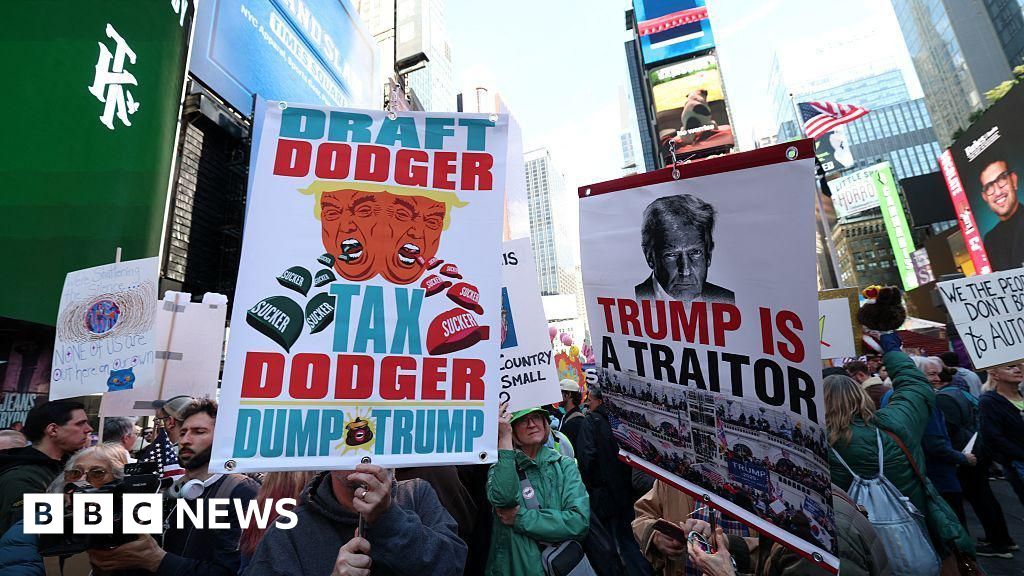**Thousands Protest Trump’s Policies Across U.S. and Abroad, Citing Fears for Democracy**
On Saturday, massive crowds of protesters filled streets in major U.S. cities—including New York, Washington D.C., Chicago, Miami, and Los Angeles—to demonstrate against President Donald Trump’s policies and what they describe as an alarming shift towards authoritarianism and the erosion of democratic principles. The protests, organized by groups such as No Kings, were widely attended and largely peaceful, despite criticism and warnings from Trump’s allies and some Republican officials.
**New York City: A Focal Point of Protest**
In New York City, the protest began Saturday morning in the heart of Times Square, quickly attracting thousands of participants. The area’s iconic streets, sidewalks, and even subway entrances became packed with demonstrators waving signs emblazoned with slogans like “Democracy not Monarchy” and “The Constitution is not optional.” The atmosphere was charged yet peaceful, with chants of “this is what democracy looks like” erupting regularly amid the rhythmic sounds of drums, cowbells, and other noisemakers.
Law enforcement maintained a watchful but low-key presence. Helicopters and drones hovered overhead, while police officers stood at the sidelines, monitoring the event. According to the New York Police Department, over 100,000 people gathered across all five boroughs throughout the day, making it one of the largest demonstrations in recent years. Notably, no protest-related arrests were reported, and officers described the event as peaceful and well-organized.
Among the protesters was Beth Zasloff, a freelance writer and editor, who expressed her distress at what she perceives as the Trump administration’s drift towards fascism and authoritarianism. “I care a lot about New York City,” she said, adding that seeing so many people united in protest gave her hope.
**Concerns About Authoritarianism and Policy Overreach**
Many demonstrators cited specific actions by President Trump as central to their concerns. Since returning to the White House, Trump has asserted a broad interpretation of presidential power. He has issued executive orders to override Congressional decisions, dismantled portions of the federal government, imposed sweeping tariffs on foreign countries, and deployed National Guard troops to cities—sometimes over the objections of state governors.
While President Trump argues that these measures are necessary to restore order and revive a nation in crisis, critics claim they are unconstitutional and threaten the foundation of American democracy. Trump has dismissed accusations of authoritarianism or fascism as “hysterical,” but for many, his rhetoric and actions have only deepened their fears.
One such protester, Massimo Mascoli, a 68-year-old retired engineer from New Jersey who grew up in Italy, drew a stark historical parallel. He invoked the memory of his uncle, a member of the anti-Mussolini resistance who was tortured and killed by fascists. “After 80 years, I didn’t expect to find fascism again in the United States,” Mascoli said. He cited the administration’s immigration crackdowns, tariffs, deployment of troops, and cuts to healthcare as particularly troubling.
Mascoli expressed a profound sense of institutional failure, stating, “We cannot count on the Supreme Court, we cannot count on the government, we cannot count on Congress. All the legislative, executive, and judiciary are against the American people right now. So we are fighting.”
**Prominent Political Figures Join In**
The scale of the protests drew attention from national political figures. Senate Minority Leader Chuck Schumer, a Democrat from New York, joined the demonstrators in Times Square. In a post on social media platform X, Schumer declared, “We have no dictators in America. And we won’t allow Trump to keep eroding our democracy,” sharing a photo of himself holding a sign that read “fix the health care crisis.”
In Washington D.C., Senator Bernie Sanders of Vermont delivered a keynote speech to a crowd of thousands. “We're not here because we hate America, we're here because we love America,” Sanders proclaimed, reflecting the sentiment of many participants who insisted their protests were a patriotic act of defense for the country’s democratic values.
**Peaceful Protests Amid Accusations and Preemptive Security Measures**
In the lead-up to the protests, Trump allies sought to frame the demonstrations as radical and potentially violent, linking them to the far-left Antifa movement. They derided the events as “hate America rallies.” Republican officials such as Kansas Senator Roger Marshall suggested that

